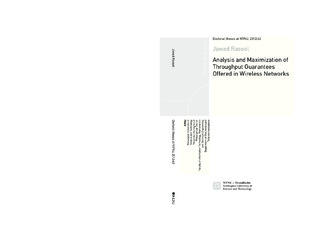| dc.contributor.advisor | Øien, Geir | nb_NO |
| dc.contributor.author | Rasool, Jawad | nb_NO |
| dc.date.accessioned | 2014-12-19T13:47:10Z | |
| dc.date.accessioned | 2015-12-22T11:46:11Z | |
| dc.date.available | 2014-12-19T13:47:10Z | |
| dc.date.available | 2015-12-22T11:46:11Z | |
| dc.date.created | 2012-05-15 | nb_NO |
| dc.date.issued | 2012 | nb_NO |
| dc.identifier | 526824 | nb_NO |
| dc.identifier.isbn | ISBN 978-82-471-3397-2 (electronic ver.) | nb_NO |
| dc.identifier.isbn | ISBN 978-82-471-3396-5 (printed ver.) | |
| dc.identifier.uri | http://hdl.handle.net/11250/2370407 | |
| dc.description.abstract | The field of wireless communications has experienced huge growth in the last decades. Various new user applications have been developed, and the demand for efficient utilization of resources has increased considerably. Opportunistic scheduling schemes can provide higher throughput and increased quality-of-service (QoS) in wireless networks by giving priority to the users with favorable channel conditions.
In this dissertation, one of the main goals is to exploit the channel variations of the user channels to design the scheduling algorithms for improved throughput guarantees. Optimization problems are formulated with an aim at finding optimal scheduling algorithms for maximizing throughput guarantees in a wireless network. We show how the solution to such problems can be obtained both when the throughput guarantees are (i) identical and (ii) different for all the mobile users. We also develop the corresponding adaptive scheduling algorithms, both for the scenarios where single user is scheduled per time-slot and where multiple users are selected in each time-slot (e.g. in MIMO systems). The real-world systems based on MobileWiMAX, HSDPA, WINNER I and LTE are considered to analyze the proposed scheduling schemes. Results from simulations show that these algorithms can improve the throughput guarantees in modern cellular networks compared to other well-known scheduling algorithms. Another goal is to analyze the performance loss of such scheduling schemes in the case of imperfect channel information at the base station. We also suggest a rate back-off mechanism to reduce the outage probability in that case. Furthermore, we also propose an approximate expression for the throughput guarantee violation probability to analyze the performance of opportunistic scheduling algorithms without conducting experimental investigations. Such an expression can be very useful for the network providers.
Most of the research in joint bandwidth and power allocation for wireless multi-user networks has focused on continuous rate, power, and bandwidth allocations in the presence of perfect channel knowledge. However, this is not the case with practical systems. In this dissertation, we therefore also consider the issue of discrete power and bandwidth allocation for discrete-rate multi-user link adaptation with imperfect channel state information. To be more specific, we discuss how the system can be designed in such a scenario for (i) sum rate maximization and (ii) average power minimization in a multi-user setting. The results show that with only a few codes, we can approach the performance of systems that employ continuous (infinitely many) rates. We have also found that the correlation between predicted and actual values of the fading envelope affects the system in the sense that the sum rate is reduced and average power consumption is increased as the correlation is reduced. | nb_NO |
| dc.language | eng | nb_NO |
| dc.publisher | Norges teknisk-naturvitenskapelige universitet | nb_NO |
| dc.relation.ispartofseries | Doctoral Theses at NTNU, 1503-8181; 2012:63 | nb_NO |
| dc.title | Analysis and Maximization of Throughput Guarantees Offered in Wireless Networks | nb_NO |
| dc.type | Doctoral thesis | nb_NO |
| dc.contributor.department | Norges teknisk-naturvitenskapelige universitet, Fakultet for informasjonsteknologi, matematikk og elektroteknikk, Institutt for elektronikk og telekommunikasjon | nb_NO |
| dc.description.degree | PhD i elektronikk og telekommunikasjon | nb_NO |
| dc.description.degree | PhD in Electronics and Telecommunication | |
